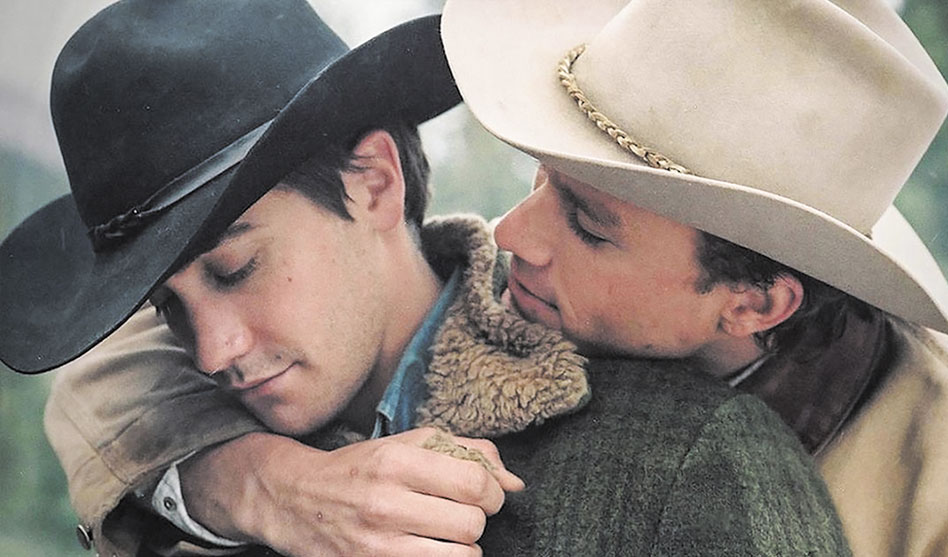When is it ok for non-LGBTQ actors play LGBTQ roles, and when is it not ok?
EDITOR’S NOTE: At the 78th Academy Awards in 2006, Brokeback Mountain was nominated for eight Academy Awards, including Best Picture, and won three awards: Best Director, Best Adapted Screenplay and Best Original Score. The 2024 Oscars, hosted by Jimmy Kimmel, will air on Sunday, March 10, at 6 p.m. on ABC.
 In 2005, audiences were captivated by the hit film Brokeback Mountain. While, nearly 20 years later, viewers continue to enjoy the film, a common critique is that the movie’s two stars, Heath Ledger and Jake Gyllenhaal, were straight. The criticism is part of an ongoing, persistent broader debate over whether or not heterosexual actors should play queer characters.
In 2005, audiences were captivated by the hit film Brokeback Mountain. While, nearly 20 years later, viewers continue to enjoy the film, a common critique is that the movie’s two stars, Heath Ledger and Jake Gyllenhaal, were straight. The criticism is part of an ongoing, persistent broader debate over whether or not heterosexual actors should play queer characters.
On one hand, people argue that experiences faced by the LGBTQ community cannot be fully understood by straight actors, while others would say that no one can fully understand a character they play and that creating your own reality is part of acting.
I typically fall into that latter group. However, I do think there are certain conditions that should be met.
As an actor myself, I feel like the whole point of acting is being something you are not. No actor is actually in love with their co-star, unless we’re talking about Emily Blunt and John Krasinski; those feelings are created by imagining a backstory and getting in the head of your character.
Straight actors are fully capable of creating realities for themselves where they are in love with someone of the same sex. Brokeback Mountain is a prime example of heterosexual performers excelling in their portrayal of gay characters; you fully believe that Ennis and Jack are passionately in love, even though the characters are played by straight actors.
Individuals who believe straight actors playing gay characters isn’t permissible may compare it to white actors playing characters of color. But this is a false equivalency. Race is a physical appearance that impacts social treatment; the physical appearance of a character of color impacts their experience in life in a way that a white actor cannot emulate.
Sexual orientation is not an outward physical appearance, so it should be treated in a different manner than race.
When questioned about his involvement in the film during an interview with The Sunday Times, Gyllenhaal stated that having straight actors play gay characters in a time when homosexuality still wasn’t widely accepted helped destigmatize it by having popular celebrities be its vehicle to opponents.
In this sense, Gyllenhaal is right. After the movie’s widespread success, more studios became interested in sharing LGBTQ stories. Not every film has the same goal; Brokeback Mountain succeeded in doing what it sought to do during a time in which it was necessary.
What’s ultimately more important than who is doing something is what, exactly, is being done. No matter who is playing a character, representations should be informed and accurate. A heterosexual actor who relies on stereotypes and tells a queer story through a straight lens is unacceptable, while a straight actor who respectfully approaches a role and does appropriate research is acceptable.
Additionally, queer involvement in a production team is also important. This is where Brokeback Mountainfalls short. When telling a queer story, it’s important to have input from LGBTQ individuals such as directors, producers and screenwriters. Brokeback Mountain did not have those elements.
In no way does this diminish the quality of the film, but it does draw attention to changes that should be made in the future.
Overall, accuracy is what is most important; these stories should be told through the lens of LGBTQ individuals and contain accurate representations regardless of the orientation of the performers. Queer stories should be told by queer people, but there’s nothing wrong with straight actors assisting in their telling.
Will Reames is a junior at Marquette University studying political science and theater arts. He was raised in North Texas by two moms who taught him the importance of helping others, which is the basis of his work.


First of all, Gay actors have been playing Straight roles throughout the history of film, it just that most people didn’t know the actors were Gay.
In the movie “Gone Girl,” out actor Neil Patrick Harris played a predatory Straight man pretty well.
Sure, I would like to see more out LGBTQ actors playing high profile roles, regardless of whether the character is Gay or Straight, as long as they can play the role convincingly.
One thing I DO feel strongly about: Trans characters really ought to be played by trans actors. A really fine example was when trans actor Jamie Clayton played trans character Nomi Marks in “Sense8.”